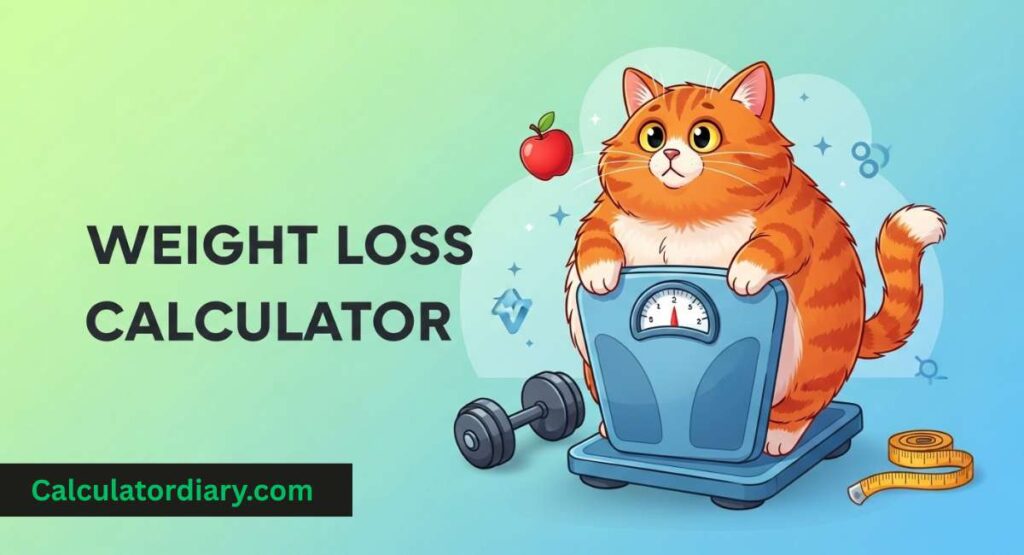Is your cat carrying a few extra pounds? Feline obesity is a silent epidemic, affecting over 50% of cats and putting them at serious risk for diabetes, arthritis, and a shortened lifespan. But crash diets are dangerous for felines, leading to a potentially fatal condition called hepatic lipidosis.
Our Cat Weight Loss Calculator is different. It provides a science-based, gradual plan for safe feline weight reduction, giving you the peace of mind that you’re helping your cat get healthy without compromising their well-being.
How the Cat Weight Loss Calculator Works
This tool simplifies complex veterinary nutrition formulas into an easy-to-use plan tailored to your cat’s unique needs.
Inputs and Data Required
To generate a custom plan, the calculator needs:
- Current Weight: In pounds (lbs) or kilograms (kg).
- Age Group: Kitten, adult, or senior.
- Spay/Neuter Status: Altered cats have slower metabolisms.
- Activity Level: Inactive (couch potato), Moderate (occasional play), Active (zoomies daily).
- Target Weight or Body Condition: Your goal, based on a healthy Body Condition Score (BCS).

Scientific Basis & Calculation Formula
Our cat calorie calculator is built on established veterinary science. The process is simple but precise:
- Calculate RER (Resting Energy Requirement): This is the calories your cat needs at complete rest.
RER = 70 × (body weight in kg)^0.75 - Apply a Safe Caloric Deficit: For healthy and sustainable feline weight management, we calculate 80% of your cat’s maintenance calories. This creates a safe 20% deficit to promote fat loss while preserving muscle.
Daily Weight Loss Calories = RER × 0.8
This step-based, gradual calorie reduction is the safest and most effective method, endorsed by veterinarians worldwide.
Calculation Example
Let’s calculate a plan for a 15 lb (6.8 kg), inactive, spayed female cat.
- RER: 70 × (6.8 kg)^0.75 = ~250 calories
- Weight Loss Calories: 250 calories × 0.8 = ~200 calories/day
This gives her owner a clear, daily calorie target to aim for.
Safety Guidelines for Cat Weight Loss
A responsible approach is non-negotiable. Always follow these veterinarian-recommended guidelines:
- Ideal Loss Rate: Aim for 0.5–2% of body weight per week (about 0.5 lb or 0.25 kg per month). Faster loss is dangerous.
- Absolute Minimum Calories: Never feed less than 70% of your cat’s RER without direct veterinary supervision.
- Recalculate Often: Re-run the cat weight loss calculator after every 10% loss in body weight to adjust the calorie target.
- Beware of Hepatic Lipidosis: Rapid weight loss can cause a fatal buildup of fat in the liver. A gradual plan is a safe plan.
- Vet Visits are Key: Always consult your veterinarian before starting any weight loss program to rule out underlying medical issues.
Practical Tips for Successful Feline Weight Loss
A calorie target is just the start. Here’s how to make it work in real life:
- Gradual Food Transition: Slowly mix new food with old over 7-10 days to avoid digestive upset.
- Scheduled Meals: Replace free-feeding with 2-4 measured meals per day.
- Get Moving: Incorporate cat-friendly exercise like two 10-minute play sessions daily using wand toys, laser pointers (with a physical reward at the end), or food puzzles.
- Track Progress: Use a baby scale to weigh your cat weekly and track the results.
- Multi-Cat Households: Feed overweight cats separately in another room to prevent food stealing.
- Smart Treating: Deduct treats from the daily calorie allowance, or use pieces of their regular kibble as “treats” during play.
Benefits of Maintaining a Healthy Cat Weight
Helping your cat achieve their ideal weight isn’t just about looks; it’s about a longer, happier life. Benefits include:
- Reduced risk of diabetes, arthritis, heart disease, and urinary issues.
- Improved energy, playfulness, and overall mood.
- Longer lifespan and significantly better quality of life.
FAQ Section
Q: Why isn’t my cat losing weight?
A: The most common reasons are underestimating treat calories, inaccurate portion sizes, or an underlying medical condition like hypothyroidism. Re-check your measurements and consult your vet.
Q: How often should I recalculate target calories?
A: Recalculate using the cat weight loss calculator every 2-4 weeks, or after every 10% of body weight is lost.
Q: Can I use the calculator for kittens or seniors?
A: This calculator is designed for healthy adult cats. Kittens have high energy needs for growth, and seniors often have medical issues—always consult your vet for their specific dietary plans.
Q: What if my cat is very obese?
A: The calculator is a great starting point. However, severely obese cats require close veterinary supervision for bloodwork and a carefully monitored weight loss journey.
Q: Is exercise mandatory for weight loss?
A: While weight loss is primarily driven by diet, exercise is crucial for preserving muscle mass, boosting metabolism, and improving mental well-being.
